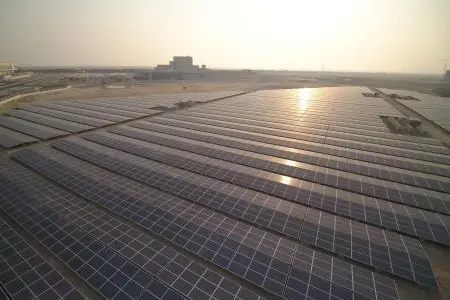PHOTO
In the presence of HE Saeed Mohammed Al Tayer, Managing Director & Chief Executive Officer of the Dubai Electricity and Water Authority (DEWA), HE Khalifa Al Zaffin, Executive Chairman-Dubai Aviation City Corporation & Dubai South, HE Massimo Baggi, Ambassador of Switzerland to the UAE and Bahrain, Dr. Franco Vigliotti, Project Head and Dean of the Swiss Federal Institute of Technology Lausanne (EPFL) in the Middle East, Marco Settembri, Executive Vice President Nestlé S.A. and CEO Zone Europe, Middle East & North Africa, and Yves Manghardt, Nestlé Middle East Chairman and CEO, the UAE’s largest ground-mounted private solar plant was launched at Nestlé Middle East’s Al Maha factory in Dubai.
The plant entails installing nearly 28,000 photovoltaic (PV) panels at the company’s three manufacturing sites, that will generate 10GWh of electricity per year – eliminating at least six million kilograms of CO2 emissions annually, the equivalent of annual emissions from 1,500 passenger cars or the energy consumption of 800 homes*. The largest site at Al Maha will alone house 20,000 PV panels, generating 7.2GWh of electricity and eliminating 4.5 million kilograms of CO2 per year.
The solar plant is part of DEWA’s Shams initiative which encourages building owners to install PV panels and connect them to DEWA’s grid.
“I am pleased to be here again at the Nestlé Al Maha factory in Dubai South, to witness the harvest of cooperation on sustainability between DEWA and Nestlé. This is a real example of the positive effect of collaboration between the public and private sectors in renewable and clean energy, which will have a positive net effect on the environment as a whole locally and internationally,” said Al Tayer. “I appreciate Nestlé’s close collaboration with DEWA to add to the achievements of the Shams Dubai initiative that we launched in support of the Smart Dubai initiative, announced by HH Sheikh Mohammed bin Rashid Al Maktoum, Vice President and Prime Minister of the UAE and Ruler of Dubai, to make Dubai the smartest and happiest city in the world. Shams Dubai has achieved remarkable success since its launch in 2014, with 1348 solar systems connected to the electricity grid so far, with a total capacity of 117MW.”
“Nestlé is committed to stewarding resources for future generations through caring for water, safeguarding the environment and acting on climate change. The solar plant in Dubai is an important contribution to Nestlé’s global ambition to achieve zero net greenhouse gas emissions by 2050. We are embracing the most ambitious aim of the Paris Agreement** to limit global temperature rise to 1.5°C,” said Settembri.
“We are determined to continue to play a positive role in the Middle East and contribute to the United Nations’ Sustainable Development Goals (SDGs). With our scale, and our actions, we can create positive impact in society, and be a force of good,” said Manghardt.
One third of Nestlé’s 413 factories in the world are already using 100% renewable electricity, and the company will continue to increase the use of energy from renewable sources. Nestlé Middle East has since 2010 achieved a 42% reduction in water withdrawal per ton of product, a 34% decrease in energy consumption, and 28% reduction in greenhouse gas emissions per ton of product, while its production went up by 68%. The company produces with zero waste for disposal at its food manufacturing sites in the region.
In addition, research and multi-sectoral partnerships are being developed to achieve the goal announced by Nestlé in 2018 to make 100% of the company’s packaging recyclable or re-usable by 2025, with the objective that none of its packaging, including plastics, ends up in landfill or as litter. Recent examples include the creation of the Nestlé Institute of Packaging Science in Lausanne (Switzerland) to evaluate and develop new sustainable packaging material and solutions in collaboration with academia, suppliers, startups, and others.
The company has already defined category and product specific manufacturing roadmaps to ensure only recyclable or reusable packaging is used by 2025. Nestlé is also playing an active role in developing plastics collection, sorting and recycling schemes across the world, through Extended Producer Responsibility (EPR) actions that are contributing to industry coalitions that aim to create circular economies within countries, recycling and reusing in a manner that creates shared value for all involved. In the Middle East, Nestlé is partner of EPR Coalitions in Abu Dhabi and Jordan.
© Press Release 2019Disclaimer: The contents of this press release was provided from an external third party provider. This website is not responsible for, and does not control, such external content. This content is provided on an “as is” and “as available” basis and has not been edited in any way. Neither this website nor our affiliates guarantee the accuracy of or endorse the views or opinions expressed in this press release.
The press release is provided for informational purposes only. The content does not provide tax, legal or investment advice or opinion regarding the suitability, value or profitability of any particular security, portfolio or investment strategy. Neither this website nor our affiliates shall be liable for any errors or inaccuracies in the content, or for any actions taken by you in reliance thereon. You expressly agree that your use of the information within this article is at your sole risk.
To the fullest extent permitted by applicable law, this website, its parent company, its subsidiaries, its affiliates and the respective shareholders, directors, officers, employees, agents, advertisers, content providers and licensors will not be liable (jointly or severally) to you for any direct, indirect, consequential, special, incidental, punitive or exemplary damages, including without limitation, lost profits, lost savings and lost revenues, whether in negligence, tort, contract or any other theory of liability, even if the parties have been advised of the possibility or could have foreseen any such damages.




















